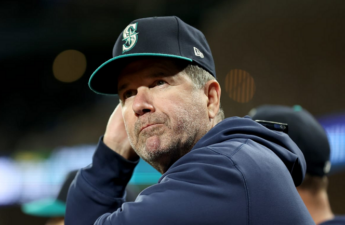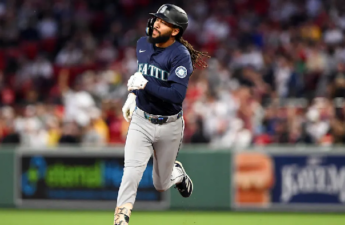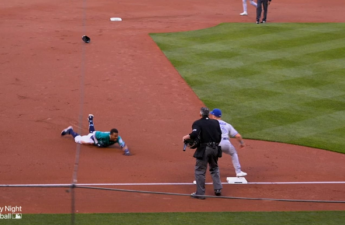First, a full disclosure. I have seen the film Harry Potter and the Deathly Hallows, Part 2 four (4) times in theaters. I started seeing scenes from the movie in dreams, in waking moments when I would sit idle for a brief time, started quoting and reciting passages in everyday conversation. It got so bad I decided to reread the book under the extremely thin excuse that I had a British copy of the book (a gift a year ago from a close friend who’d visited Britain) and I hadn’t read the version with extra u’s in it yet. It should be noted that I have reread perhaps five or six books in my entire life, at least once I got past the echelon of tomes authored by one D. Seuss. This is a rare occasion, but one I started before viewing four but didn’t complete till after it.
I have also done ancillary reading and research on Harry Potter, with particular focus on this installment of the book and the film. The film was more excellent in my first couple viewings than it seemed in rereading the book. Especially the final bits, which are so much better conveyed in the book. The movie did a good job of making me forget how much better the book was because it, itself, was good. I read reviews, I read analyses, I signed up for Pottermore, I was just eating and breathing a whole HP world for something like a month.
And throughout, despite most people joining with me in the belief that Harry Potter is excellent overall, that the movie was generally a great adaptation of the book, that the book was an excellent conclusion to the series (possible qualms about the deus ex machina survival of Harry aside – and no, you don’t get a spoiler alert, because look at the title of this post and have you been living under a rock?), and so on, there has been one almost universal critique. Everyone hates the epilogue. Everyone, I should note, except me.
When I first read it, I adored the epilogue. I thought it was maybe a tiny bit too pat as far as there being no trouble at all in the last line, but otherwise every prior word was great. And I couldn’t believe those who criticized it after comparing notes. And now I’ve had the opportunity to see endless lampoonery heaped on it from almost every corner, to the point where people are attributing all but the very ruination of Harry Potter itself as a phenomenon to a few thin pages under the banner of Nineteen Years Later. So allow me, if you will, a bit of time to defend what I think is a key part of Harry Potter’s literary ascendance from great young adult reading to true literature.
By far the shallowest and yet most pervasive critique of the epilogue is that it doesn’t make any sense that everyone (or the key figures at least) marries the person they’re with throughout the duration of Book 7. Prominently, of course, that Harry marries Ginny and Ron marries Hermione. Now we can leave aside doubts about Ron and Hermione’s coupling to begin with, but that doesn’t seem to be the objection most people have. No, they say, it’s obvious that people have to go through lots of cycles with tons of people after school before finding the people they marry and this is an amateurish attempt to make the fans happy.
First of all, how many of these people have ever been through a war? Like, in their homeland? Have you ever seen the impact that trying circumstances, that life-or-death traumatic situations have on people’s relationships? They bind people together like little else. It’s an unfortunate fact that timing plays an enormous role in who we end up with (don’t make me dwell on this too much right about now), and the sense of timing can greatly be enhanced by the kind of urgency and meaning that being close to death infuses into a situation. The fact that so many of these couples from the 7th year at Hogwarts stay together to marriage is actually evidence that JK Rowling has great insight into actual human behavior and is the opposite of amateurish.
It should also be noted that the wizarding world clearly matures and marries at an overall younger age than its more modern counterparts. Surely you’ve noticed there’s no university education in wizarding Britain. Hogwarts is an amalgam of the classic boarding school and college. Graduating Hogwarts makes you a full wizarding adult, so it naturally follows that this is chronologically more like university than high school. And that makes finding a mate at that time far more reasonable and understandable than the lampooners portray.
I can’t really figure out why else people hate the epilogue – many of the critiques seem to just sort of see it as self-evident. I’ve heard that the whole thing, not just the last line, is too pat. I think it should be noted here that JK Rowling had sworn off writing anything more about the Harry Potter world (something she’s already repeatedly gone back on, but she must’ve believed it at the time), so she was trying to wrap up a whole landscape she didn’t want to revisit. To do that with an ending in the rubble of Hogwarts would be far more unsatisfying than to provide some sort of perspective and closure, besides opening the door wide for endless speculation and clamoring for sequels. It seems Rowling wanted to get very much away from being pigeonholed as a writer the rest of her career and that, possibly sadly, she’s being forced back into that comfort zone, whether it’s from the pressure of expectations or her own nervousness at failing at something else. The point is, only by offering some closure and making it seem as unadventurous and unthrilling as possible could she have a hope at ending the series instead of turning 7 books into 10 or 14 or 21. And I think that’s perfectly reasonable. Any opening for major ongoing conflict or strife would’ve been an invitation to that expansion.
It’s also worth noting the beauty of the narrative arc that’s completed in the closing of the scene on Platform 9.75, which is far more evident and obvious from the movie than it is from the book. (I also think the movie gives a slight out for people who don’t like the epilogue – the three protagonists close their eyes while holding hands on the bridge at the close of the main part of the movie, making it possible to believe they are all envisioning what their future will be like in 19 years and possibly even apparating to that vision. Watch it again – it’s there.) The close reminds us that each generation has its challenges, just as Harry struggles with in relation to all the people of his parents’ generation and their struggle against the same foe. By stringing us back to the place where it began, we can find our place in the cycle of life now as an older generation thinking of others to come after us, having grown up with Harry and the series. It’s, in a word, brilliant. It seems obvious that for the real impact of the entire effort to be felt, we need something expository like this to put the whole trajectory and experience in perspective, especially given how much speculating about even having a future that Harry does during the book and the entire series.
Not only do we get to see what Harry’s life on borrowed time came to, that he fulfilled the simple desires of life that we all forget to appreciate while we’re enjoying them because few of us came back from the dead, but we get to put ourselves on that train anew and remember where we’ve come from as Harry, Ginny, Ron, and Hermione are doing on that platform. You can also believe that it’s about seeing everyone off to safety and happily ever after, but even the pat ending that Harry isn’t bothered anymore doesn’t promise that it’ll always be that way. But now we’re speculating about future lives of characters we don’t even know, making our insistence to hear their story less important than its reflection on our own lives.
You don’t have to be as obsessed as I strangely became with this work of art to recognize that it’s really excellent literature that takes the next step and has something meaningful to say to all of us. I just wish people could trust the author enough to recognize the merit of the whole work, not just the parts they particularly like. Even the deus ex machina is growing on me, which is real proof that Rowling’s won my respect, word by word.


